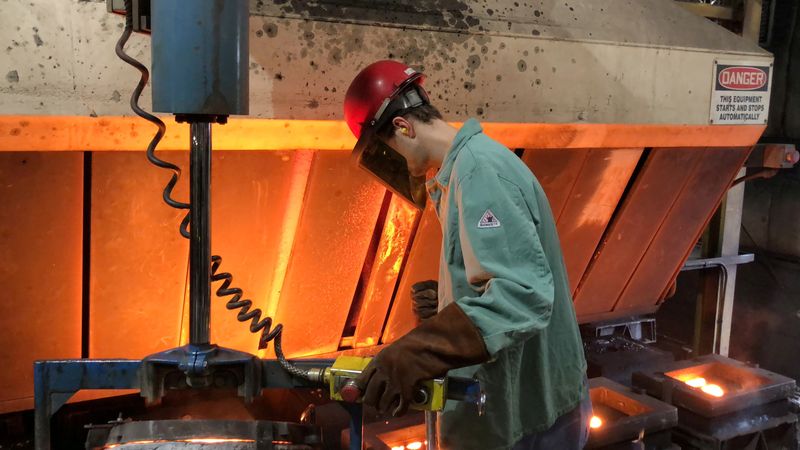By Lucia Mutikani
WASHINGTON (Reuters) - New orders for key U.S.-manufactured capital goods unexpectedly rose in February, but data for the prior month was revised sharply down, suggesting that business spending on equipment could be struggling to rebound in the first quarter.
While a survey from S&P Global (NYSE:SPGI) on Friday showed business activity gaining steam in March, manufacturing contracted for a fifth straight month. The reports likely confirm that manufacturing is in recession, weighed down by higher borrowing costs. With financial conditions tightening following the recent failure of two regional banks, the outlook for both business investment and manufacturing is cloudy.
"We anticipate gloomier times ahead as spending softens, lending standards tighten and higher interest rates than the post-global financial crisis period make it costly to purchase capital goods and finance investment," said Oren Klachkin, lead U.S. economist at Oxford Economics in New York. "The recent bout of banking sector stress will only add to upcoming strains."
Orders for non-defense capital goods excluding aircraft, a closely watched proxy for business spending plans, increased 0.2% last month, the Commerce Department said. Data for January was revised lower to show these so-called core capital goods orders rising 0.3% instead of 0.8% as previously reported.
(Graphics: Core capital goods - https://www.reuters.com/graphics/USA-STOCKS/xmpjkbqkxvr/corecap.png)
Economists polled by Reuters had forecast core capital goods orders unchanged. Core capital goods orders advanced 4.3% on a year-on-year basis in February. The data is not adjusted for inflation. Producer prices for finished goods, excluding food, have exceeded the monthly gains in core capital goods orders.
That means inflation adjusted orders were weak. The report is consistent with regional Federal Reserve bank factory surveys showing business sentiment remaining depressed so far this year.
That was reinforced by the S&P Global survey showing its flash manufacturing PMI climbed to a still-subdued 49.3 in March from 47.3 in February. Manufacturing, which accounts for 11.3% of the U.S. economy, has contracted for two straight quarters as higher interest rates undercut demand for goods, which are typically bought on credit.
(Graphic: Flash PMI - https://www.reuters.com/graphics/USA-STOCKS/mypmobqorpr/pmi.png)
Spending is also shifting away from goods to services, while the dollar's past appreciation and sluggish global growth are curbing exports. The inventory cycle is also turning, with restocking by businesses slowing.
There are expectations that the tightening of lending standards by banks following recent financial markets turmoil could make credit less available to households and businesses.
The Federal Reserve on Wednesday raised its benchmark overnight interest rate by a quarter of a percentage point, but indicated it was on the verge of pausing further increases in borrowing costs, in a nod to the financial markets stress.
Stocks on Wall Street fell on renewed fears of contagion in the banking sector. The dollar rose against a basket of currencies. U.S. Treasury prices were higher.
BLOW TO INVESTMENT
"While the extent of the drag from events over the past couple of weeks remains to be seen, it would be a surprise if it didn't deal a further blow to investment, particularly for small firms more reliant on bank financing," said Andrew Hunter, deputy chief U.S. economist at Capital Economics.
Last month, there were increases in orders for electrical equipment, appliances and components, fabricated metal products and well as primary metals. But orders for computers and electronic products dipped and machinery fell.
Shipments of core capital goods were unchanged after increasing 0.9% in January. Core capital goods shipments are used to calculate equipment spending in the gross domestic product measurement. Shipments of nondefense capital goods, which also go into the calculation of GDP, fell 0.6% after declining 1.7% in January.
Economists at Goldman Sachs (NYSE:GS) trimmed their first-quarter GDP growth estimate to a 2.4% annualized rate from a 2.6% pace. Business spending on equipment contracted in the fourth quarter, helping to restrain GDP growth to a 2.7% rate. The economy grew at a 3.2% pace in the third quarter.
"The manufacturing sector is in recession and will be a drag on the broader economy," said Conrad DeQuadros, senior economic advisor at Brean Capital in New York. "Business equipment spending may contract in real terms in the first-quarter GDP report."
Orders for items ranging from toasters to aircraft that are meant to last three years or more decreased 1.0% in February. These so-called durable goods orders dropped 5.0% in January.
Durable goods orders last month were pulled down by a 6.6% decline in the volatile civilian aircraft category, which followed a 56.3% plunge in January. Boeing (NYSE:BA) reported on its website that it had received just five aircraft orders in February, sharply down from 55 in January.
Orders for transportation equipment fell 2.8% after tumbling 14.0% in January. Motor vehicle orders decreased 0.9%.
(Graphic: Durable goods - https://www.reuters.com/graphics/USA-STOCKS/zjpqjndjmvx/durablegoods.png)
Unfilled orders at manufacturers slipped 0.1% after being unchanged in January, which does not bode well for factory production. Inventories at factories rebounded 0.2%.
"As inventories rise, container volume to U.S. ports is declining, suggesting that shipments could weaken further in the months ahead," said Erik Johnson, a senior economist at BMO Capital Markets in Toronto.
